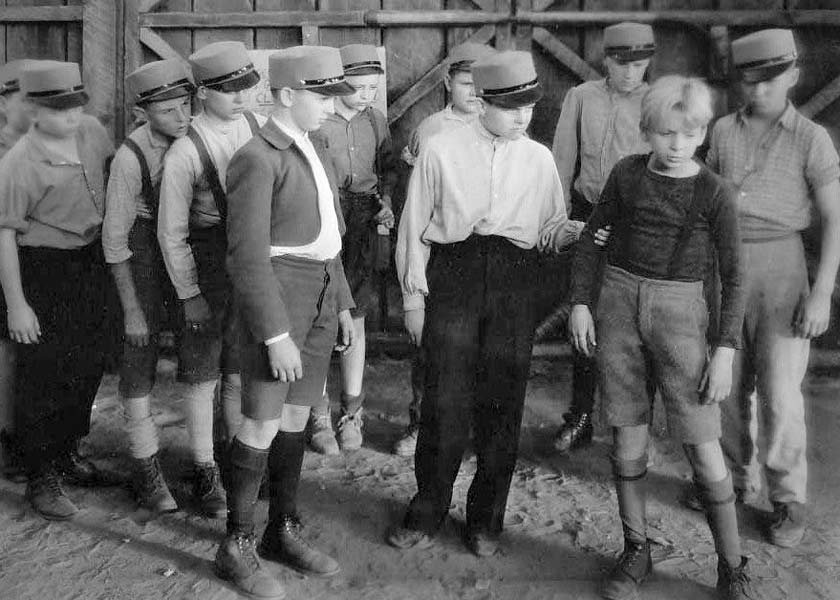Synopsis
The film opens on a scene of soldiers fighting with bayonets. A man in civilian clothes cries out that war is useless, and he will fight no more. The scene shifts to a classroom where the teacher (Egon Brecher) is haranguing the class about the glory of patriotism and fighting for one's country. The teacher questions a group of boys about their gang and their impeding fight with another gang over their playground, a vacant lot. He says he will break up both gangs. The gang known as the Paul Street Boys meets in the lot. They have a military organization. The youngest and smallest boy, Nemeecsek (Breakston), is the only private. He pleads to be made an officer and wear a hat. The other boys refuse.
The second gang, The Red Shirts, is made up of older and bigger boys, led by Feri Ats (Darro). Feri steals the Paul Street Boys' flag. Three Paul Street boys, including Boka (Butler), the president of the gang and Nemeecsek attempt to take back their flag, but fail. Later, Nemeecsek returns alone to get the flag, but falls out of a tree into the middle of the Red Shirts' meeting. He defies them. Feri admires his spirit but has him dunked. The Paul Street Boys prepare to fight the Red Shirts for possession of the vacant lot. Possession of the Paul Street Boys' flag at the end of the fight will decide the winner. Nemeecsek, sick because of his exposure to wet and cold during the dunking, is home in bed. He is visited by Boka, who brings him a hat and makes him an officer, and by members of the Red Shirts. They were sent by Feri who feels guilt over the dunking. Nemeecsek, who knows the fighting has started, dresses and hurries to join it. When he arrives, the fight is nearly over and Feri still holds the flag. Nemeecsek tackles Feri, then collapses and dies. His mother (Lois Wilson) carries him home. The boys of both gangs follow sorrowfully. Several days later, the two gangs hold a joint memorial and raise the flag. Across from them, a sand shovel is starting to dig the foundation for an apartment to be built on the lot.
Discussion
No Greater Glory is one of the most unusual films of the 1930s. An antiwar allegory, the film is based on the novel The Paul Street Boys by Ferenc Molnar. In his book about Frank Borzage, film historian Frederick Lamster discusses a recurring theme of his films: an individual (or a small, tightly-knit group), set against a disruptive force, grows in self-knowledge, transcends the immediate surroundings, and discovers universal truths. In No Greater Glory, the death of Nemeecsek brings peace to the boys, and they learn about loyalty, bravery, and determination. The film exposes the futility of violence; the masculine ideal of war is reduced to a battle between boy's clubs fighting over a vacant lot that the winning club will soon lose to an apartment building.
Frank Borzage was an important director of the silent and sound era. His other notable films include Humoresque (1920), 7th Heaven (1927), Street Angel (1928), A Farewell to Arms (1932), The Mortal Storm (1940) and His Butler's Sister (1943). He won the first Academy Award for Best Director for 7th Heaven and was awarded a second time for Bad Girl (1931).
Three excellent child actors star in the film. Jackie Searl and Frankie Darro, although young, were already veteran film actors by 1934. George P. Breakston, who had appeared in only one previous film, had the most important role of his career in No Greater Glory.

